Annotated Bibliography: Knowledge Sharing and Environmental Issues
VerifiedAdded on 2021/06/17
|7
|985
|66
Annotated Bibliography
AI Summary
This annotated bibliography presents two journal articles focusing on knowledge management within a business context. The first article by Boiral (2002) examines the significance of tacit knowledge in environmental management, exploring how organizations can leverage employee insights for identifying pollution sources, managing crises, and developing preventive solutions. The second article by Li (2010) investigates virtual knowledge sharing in a cross-cultural context, comparing American and Chinese employees' online knowledge-sharing behaviors and identifying key influencing factors such as organizational issues, cultural differences, and online communities of practice. The annotations summarize the purpose, methodology, findings, limitations, and implications of each study, highlighting their relevance to business development and knowledge management practices, particularly in multinational organizations.
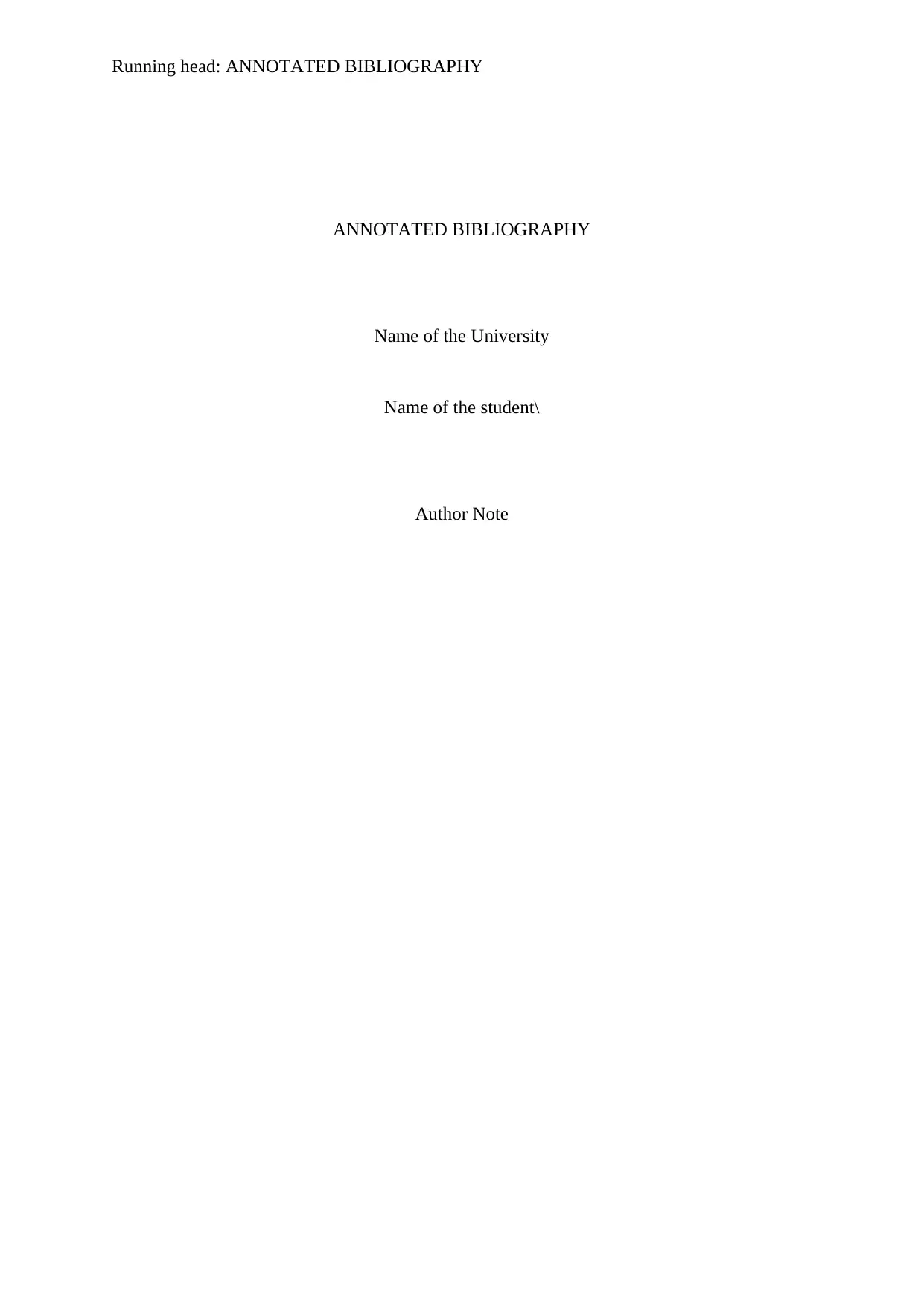
Running head: ANNOTATED BIBLIOGRAPHY
ANNOTATED BIBLIOGRAPHY
Name of the University
Name of the student\
Author Note
ANNOTATED BIBLIOGRAPHY
Name of the University
Name of the student\
Author Note
Paraphrase This Document
Need a fresh take? Get an instant paraphrase of this document with our AI Paraphraser
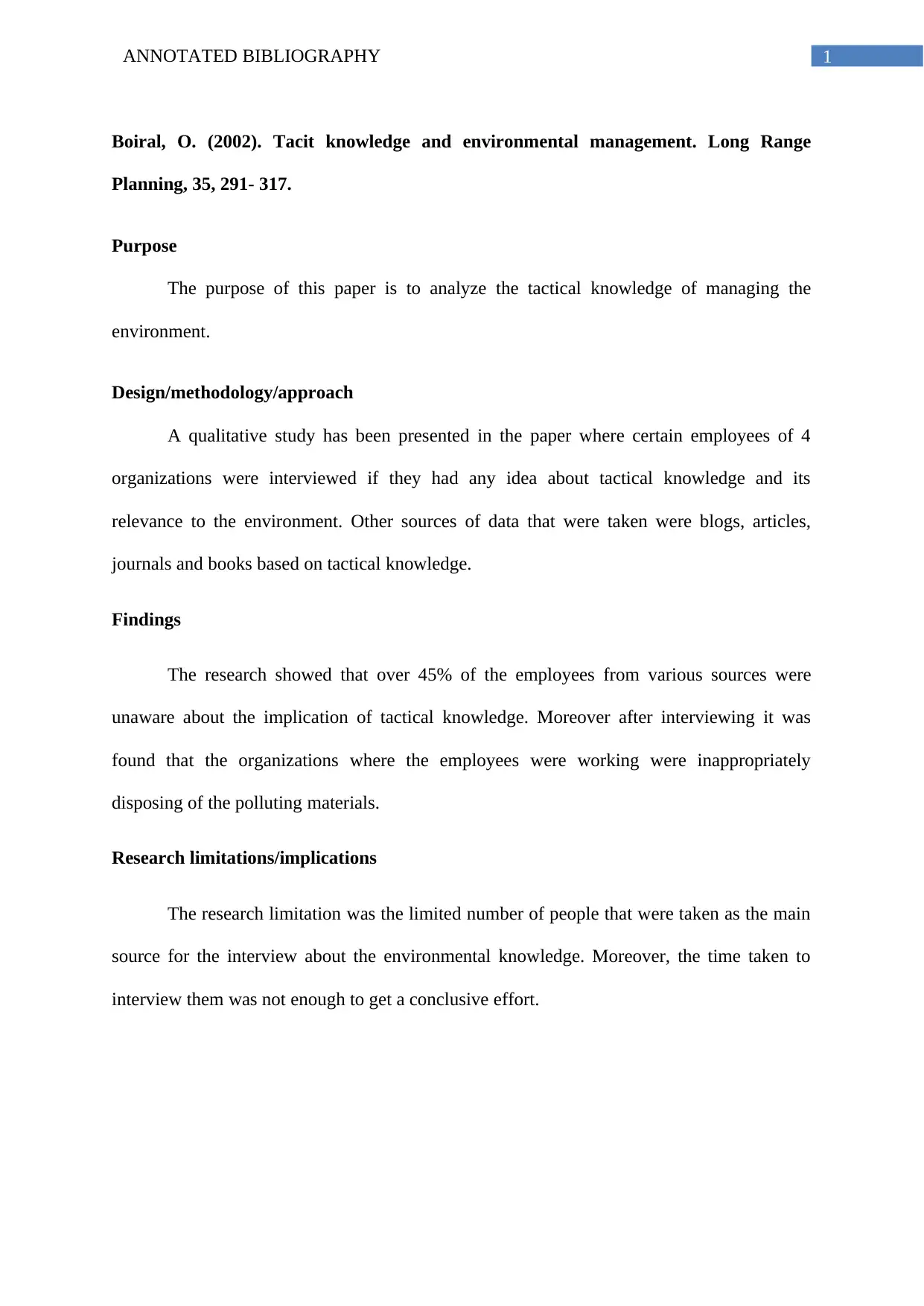
1ANNOTATED BIBLIOGRAPHY
Boiral, O. (2002). Tacit knowledge and environmental management. Long Range
Planning, 35, 291- 317.
Purpose
The purpose of this paper is to analyze the tactical knowledge of managing the
environment.
Design/methodology/approach
A qualitative study has been presented in the paper where certain employees of 4
organizations were interviewed if they had any idea about tactical knowledge and its
relevance to the environment. Other sources of data that were taken were blogs, articles,
journals and books based on tactical knowledge.
Findings
The research showed that over 45% of the employees from various sources were
unaware about the implication of tactical knowledge. Moreover after interviewing it was
found that the organizations where the employees were working were inappropriately
disposing of the polluting materials.
Research limitations/implications
The research limitation was the limited number of people that were taken as the main
source for the interview about the environmental knowledge. Moreover, the time taken to
interview them was not enough to get a conclusive effort.
Boiral, O. (2002). Tacit knowledge and environmental management. Long Range
Planning, 35, 291- 317.
Purpose
The purpose of this paper is to analyze the tactical knowledge of managing the
environment.
Design/methodology/approach
A qualitative study has been presented in the paper where certain employees of 4
organizations were interviewed if they had any idea about tactical knowledge and its
relevance to the environment. Other sources of data that were taken were blogs, articles,
journals and books based on tactical knowledge.
Findings
The research showed that over 45% of the employees from various sources were
unaware about the implication of tactical knowledge. Moreover after interviewing it was
found that the organizations where the employees were working were inappropriately
disposing of the polluting materials.
Research limitations/implications
The research limitation was the limited number of people that were taken as the main
source for the interview about the environmental knowledge. Moreover, the time taken to
interview them was not enough to get a conclusive effort.
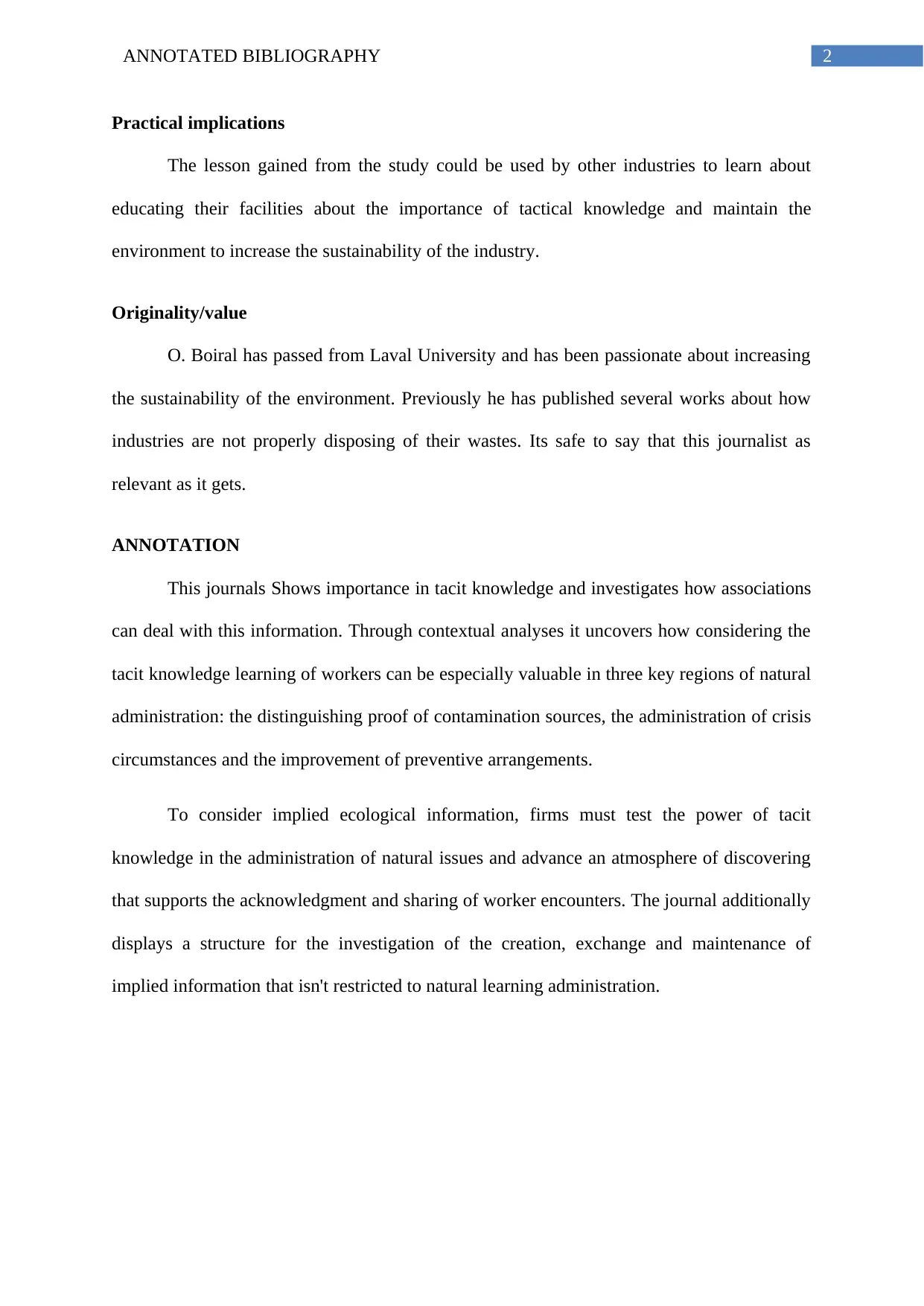
2ANNOTATED BIBLIOGRAPHY
Practical implications
The lesson gained from the study could be used by other industries to learn about
educating their facilities about the importance of tactical knowledge and maintain the
environment to increase the sustainability of the industry.
Originality/value
O. Boiral has passed from Laval University and has been passionate about increasing
the sustainability of the environment. Previously he has published several works about how
industries are not properly disposing of their wastes. Its safe to say that this journalist as
relevant as it gets.
ANNOTATION
This journals Shows importance in tacit knowledge and investigates how associations
can deal with this information. Through contextual analyses it uncovers how considering the
tacit knowledge learning of workers can be especially valuable in three key regions of natural
administration: the distinguishing proof of contamination sources, the administration of crisis
circumstances and the improvement of preventive arrangements.
To consider implied ecological information, firms must test the power of tacit
knowledge in the administration of natural issues and advance an atmosphere of discovering
that supports the acknowledgment and sharing of worker encounters. The journal additionally
displays a structure for the investigation of the creation, exchange and maintenance of
implied information that isn't restricted to natural learning administration.
Practical implications
The lesson gained from the study could be used by other industries to learn about
educating their facilities about the importance of tactical knowledge and maintain the
environment to increase the sustainability of the industry.
Originality/value
O. Boiral has passed from Laval University and has been passionate about increasing
the sustainability of the environment. Previously he has published several works about how
industries are not properly disposing of their wastes. Its safe to say that this journalist as
relevant as it gets.
ANNOTATION
This journals Shows importance in tacit knowledge and investigates how associations
can deal with this information. Through contextual analyses it uncovers how considering the
tacit knowledge learning of workers can be especially valuable in three key regions of natural
administration: the distinguishing proof of contamination sources, the administration of crisis
circumstances and the improvement of preventive arrangements.
To consider implied ecological information, firms must test the power of tacit
knowledge in the administration of natural issues and advance an atmosphere of discovering
that supports the acknowledgment and sharing of worker encounters. The journal additionally
displays a structure for the investigation of the creation, exchange and maintenance of
implied information that isn't restricted to natural learning administration.
⊘ This is a preview!⊘
Do you want full access?
Subscribe today to unlock all pages.

Trusted by 1+ million students worldwide
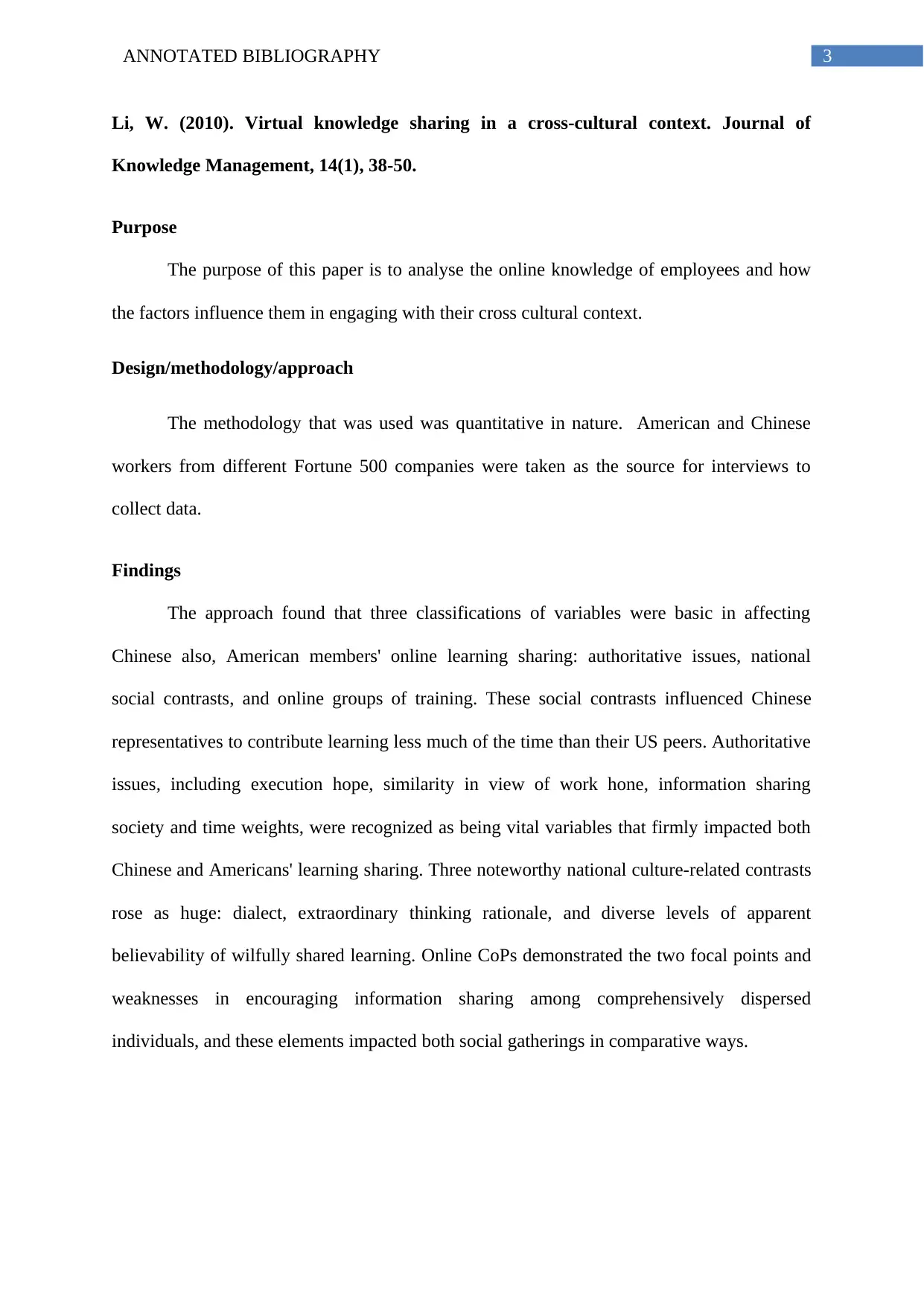
3ANNOTATED BIBLIOGRAPHY
Li, W. (2010). Virtual knowledge sharing in a cross-cultural context. Journal of
Knowledge Management, 14(1), 38-50.
Purpose
The purpose of this paper is to analyse the online knowledge of employees and how
the factors influence them in engaging with their cross cultural context.
Design/methodology/approach
The methodology that was used was quantitative in nature. American and Chinese
workers from different Fortune 500 companies were taken as the source for interviews to
collect data.
Findings
The approach found that three classifications of variables were basic in affecting
Chinese also, American members' online learning sharing: authoritative issues, national
social contrasts, and online groups of training. These social contrasts influenced Chinese
representatives to contribute learning less much of the time than their US peers. Authoritative
issues, including execution hope, similarity in view of work hone, information sharing
society and time weights, were recognized as being vital variables that firmly impacted both
Chinese and Americans' learning sharing. Three noteworthy national culture-related contrasts
rose as huge: dialect, extraordinary thinking rationale, and diverse levels of apparent
believability of wilfully shared learning. Online CoPs demonstrated the two focal points and
weaknesses in encouraging information sharing among comprehensively dispersed
individuals, and these elements impacted both social gatherings in comparative ways.
Li, W. (2010). Virtual knowledge sharing in a cross-cultural context. Journal of
Knowledge Management, 14(1), 38-50.
Purpose
The purpose of this paper is to analyse the online knowledge of employees and how
the factors influence them in engaging with their cross cultural context.
Design/methodology/approach
The methodology that was used was quantitative in nature. American and Chinese
workers from different Fortune 500 companies were taken as the source for interviews to
collect data.
Findings
The approach found that three classifications of variables were basic in affecting
Chinese also, American members' online learning sharing: authoritative issues, national
social contrasts, and online groups of training. These social contrasts influenced Chinese
representatives to contribute learning less much of the time than their US peers. Authoritative
issues, including execution hope, similarity in view of work hone, information sharing
society and time weights, were recognized as being vital variables that firmly impacted both
Chinese and Americans' learning sharing. Three noteworthy national culture-related contrasts
rose as huge: dialect, extraordinary thinking rationale, and diverse levels of apparent
believability of wilfully shared learning. Online CoPs demonstrated the two focal points and
weaknesses in encouraging information sharing among comprehensively dispersed
individuals, and these elements impacted both social gatherings in comparative ways.
Paraphrase This Document
Need a fresh take? Get an instant paraphrase of this document with our AI Paraphraser
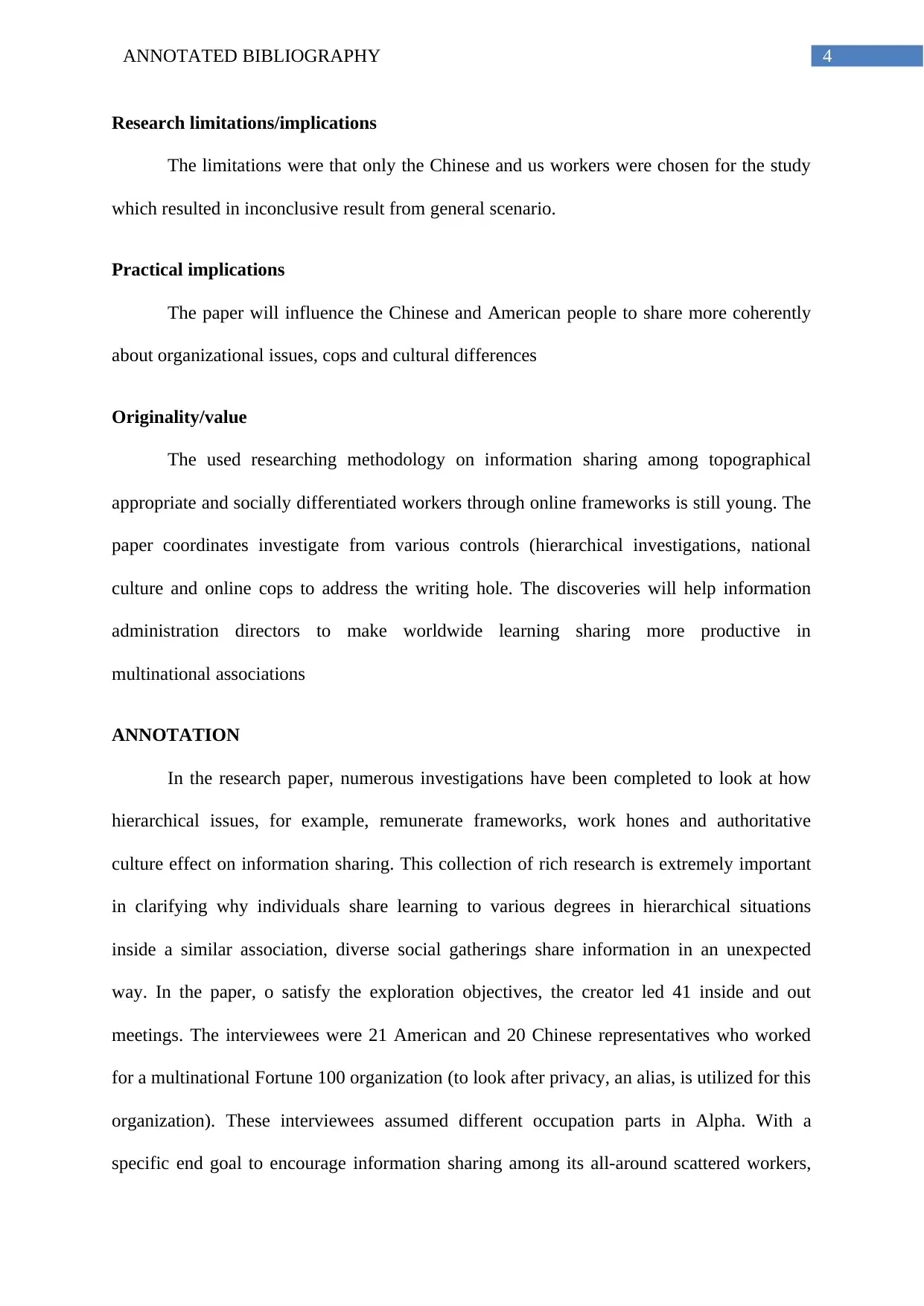
4ANNOTATED BIBLIOGRAPHY
Research limitations/implications
The limitations were that only the Chinese and us workers were chosen for the study
which resulted in inconclusive result from general scenario.
Practical implications
The paper will influence the Chinese and American people to share more coherently
about organizational issues, cops and cultural differences
Originality/value
The used researching methodology on information sharing among topographical
appropriate and socially differentiated workers through online frameworks is still young. The
paper coordinates investigate from various controls (hierarchical investigations, national
culture and online cops to address the writing hole. The discoveries will help information
administration directors to make worldwide learning sharing more productive in
multinational associations
ANNOTATION
In the research paper, numerous investigations have been completed to look at how
hierarchical issues, for example, remunerate frameworks, work hones and authoritative
culture effect on information sharing. This collection of rich research is extremely important
in clarifying why individuals share learning to various degrees in hierarchical situations
inside a similar association, diverse social gatherings share information in an unexpected
way. In the paper, o satisfy the exploration objectives, the creator led 41 inside and out
meetings. The interviewees were 21 American and 20 Chinese representatives who worked
for a multinational Fortune 100 organization (to look after privacy, an alias, is utilized for this
organization). These interviewees assumed different occupation parts in Alpha. With a
specific end goal to encourage information sharing among its all-around scattered workers,
Research limitations/implications
The limitations were that only the Chinese and us workers were chosen for the study
which resulted in inconclusive result from general scenario.
Practical implications
The paper will influence the Chinese and American people to share more coherently
about organizational issues, cops and cultural differences
Originality/value
The used researching methodology on information sharing among topographical
appropriate and socially differentiated workers through online frameworks is still young. The
paper coordinates investigate from various controls (hierarchical investigations, national
culture and online cops to address the writing hole. The discoveries will help information
administration directors to make worldwide learning sharing more productive in
multinational associations
ANNOTATION
In the research paper, numerous investigations have been completed to look at how
hierarchical issues, for example, remunerate frameworks, work hones and authoritative
culture effect on information sharing. This collection of rich research is extremely important
in clarifying why individuals share learning to various degrees in hierarchical situations
inside a similar association, diverse social gatherings share information in an unexpected
way. In the paper, o satisfy the exploration objectives, the creator led 41 inside and out
meetings. The interviewees were 21 American and 20 Chinese representatives who worked
for a multinational Fortune 100 organization (to look after privacy, an alias, is utilized for this
organization). These interviewees assumed different occupation parts in Alpha. With a
specific end goal to encourage information sharing among its all-around scattered workers,
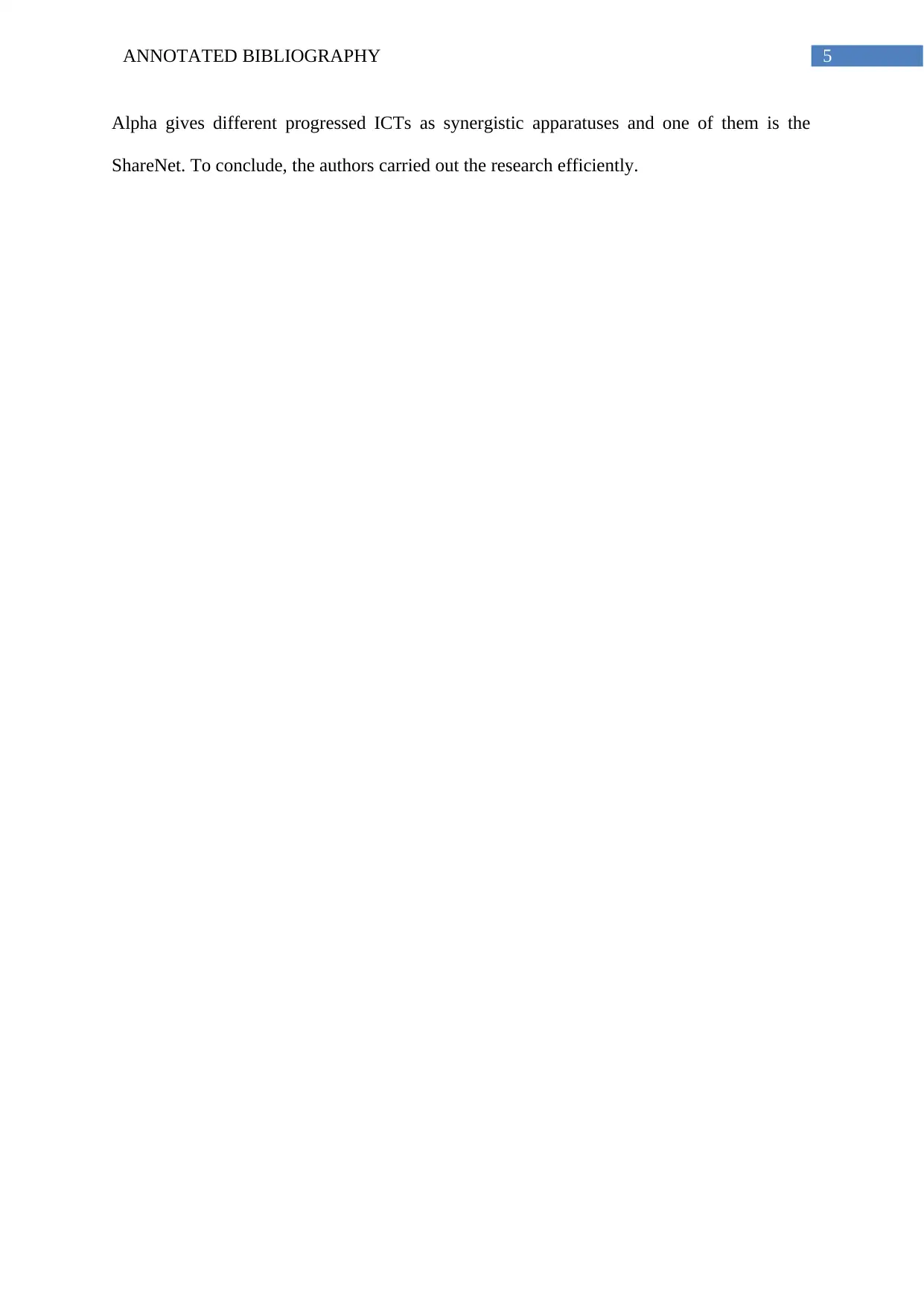
5ANNOTATED BIBLIOGRAPHY
Alpha gives different progressed ICTs as synergistic apparatuses and one of them is the
ShareNet. To conclude, the authors carried out the research efficiently.
Alpha gives different progressed ICTs as synergistic apparatuses and one of them is the
ShareNet. To conclude, the authors carried out the research efficiently.
⊘ This is a preview!⊘
Do you want full access?
Subscribe today to unlock all pages.

Trusted by 1+ million students worldwide
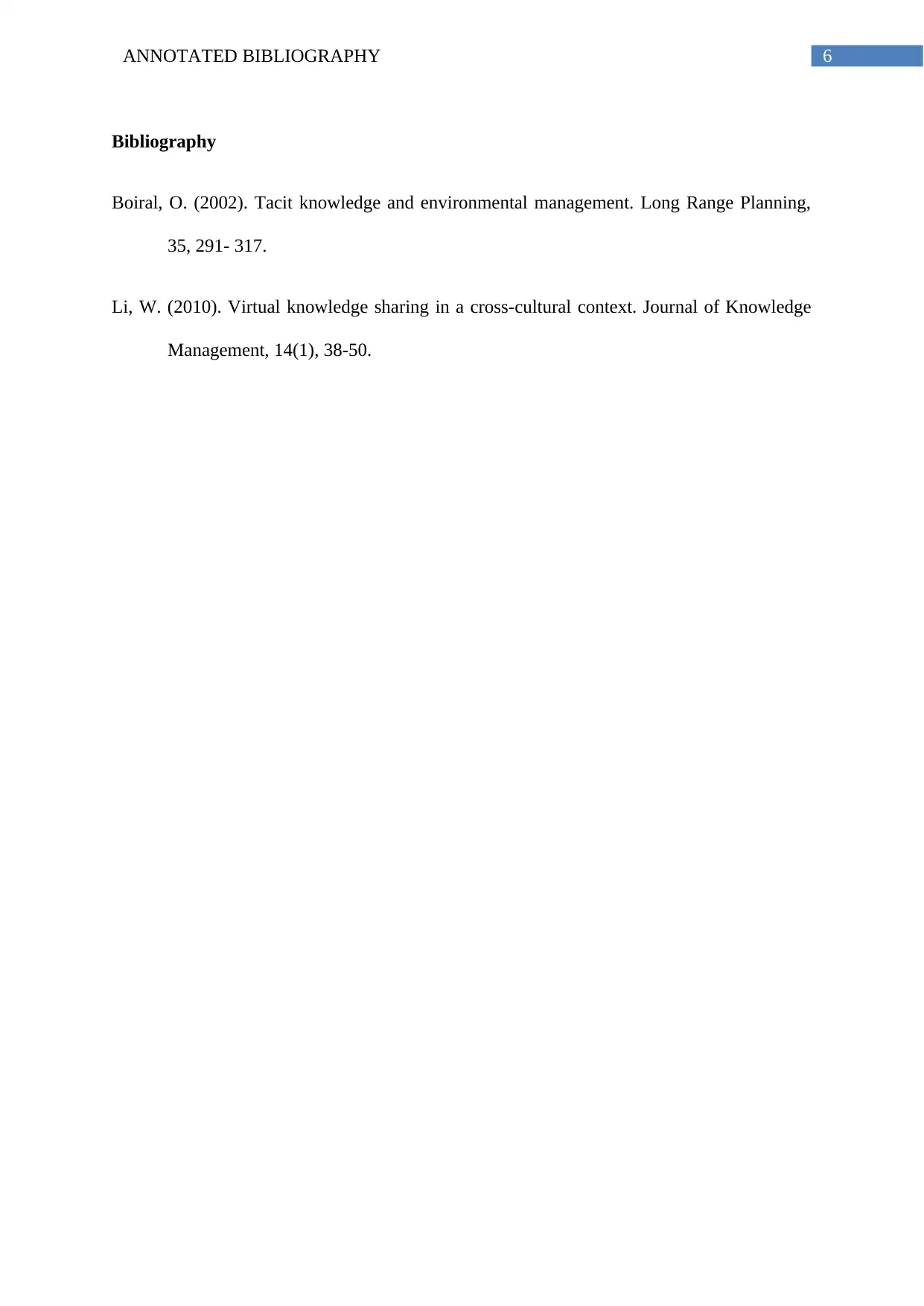
6ANNOTATED BIBLIOGRAPHY
Bibliography
Boiral, O. (2002). Tacit knowledge and environmental management. Long Range Planning,
35, 291- 317.
Li, W. (2010). Virtual knowledge sharing in a cross-cultural context. Journal of Knowledge
Management, 14(1), 38-50.
Bibliography
Boiral, O. (2002). Tacit knowledge and environmental management. Long Range Planning,
35, 291- 317.
Li, W. (2010). Virtual knowledge sharing in a cross-cultural context. Journal of Knowledge
Management, 14(1), 38-50.
1 out of 7
Your All-in-One AI-Powered Toolkit for Academic Success.
+13062052269
info@desklib.com
Available 24*7 on WhatsApp / Email
![[object Object]](/_next/static/media/star-bottom.7253800d.svg)
Unlock your academic potential
Copyright © 2020–2026 A2Z Services. All Rights Reserved. Developed and managed by ZUCOL.


